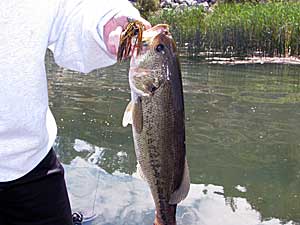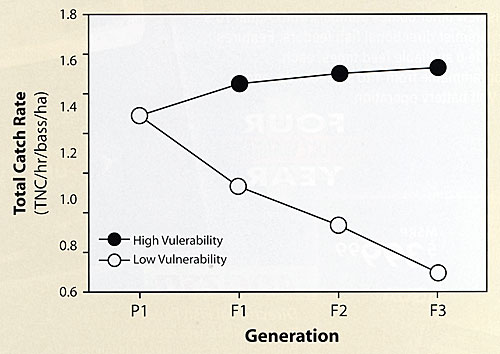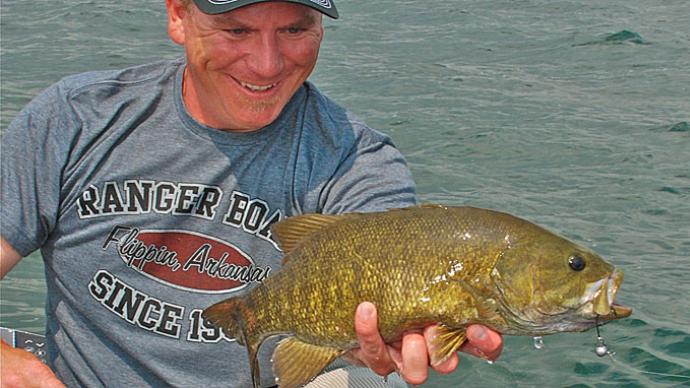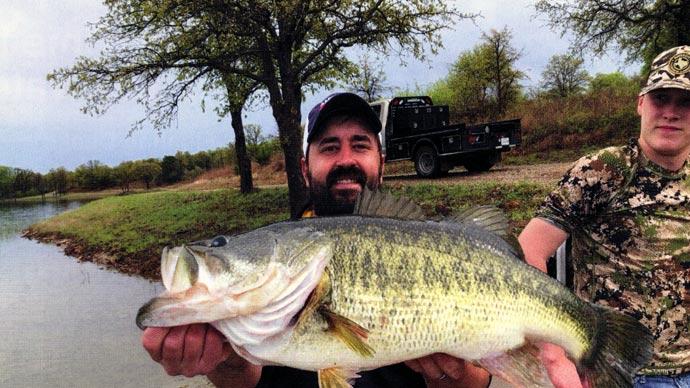
"I just can't catch my fish like I expect." Poor catchability is an often-discussed problem among anglers. It has been debated on several occasions on the BassResource Forum and articles have appeared in Pond Boss magazine concerning possible management options.
A new study entitled Selection for Vulnerability to Angling in Largemouth Bass by David P. Philipp, Steven J. Cooke, Julie E. Claussen, Jeffrey B. Koppelman, Cory D. Suski and Dale P. Burkett in Transactions of the American Fisheries Society 138: 189-199, 2009, American Fisheries Society 2009, addressed if catchability is genetically based by conducting a long-term selection experiment to assess the heritability of vulnerability to angling in largemouth bass Micropterus salmoides. This article builds on prior material like; Garrett (2002) Behavioral Modification of Angling Vulnerability in Largemouth Bass Through Selective Breeding, Pages 323-334 in Black Bass Ecology, Conservation and Management American Fisheries Society Symposium 31, which revealed and quantified the difference in catchability between Florida strain Largemouth Bass and Northern strain Largemouth Bass and established that the reduced catchability of the Floridas was passed on to successive generations.
At this point you may ask, "What difference does this make?" The problem is as the authors provide..."if vulnerability to angling does, in fact, have a significant heritable component, removing the more vulnerable individuals in a given population would allow the less vulnerable individuals to perpetuate with greater success, thereby decreasing the average level of vulnerability to angling across the entire population." In other words, if you catch and remove the most aggressive fish, it would become very hard, over time, to catch fish from the lake.
Figure 1 summarizes what the study found - that catchability in northern strain largemouth bass is also a genetic trait.

Some of the more notable points or comments by the authors:
We do know that increases in largemouth bass angling pressure leads to decreases in catch rates.
Our study involving largemouth bass provides the first direct experimental evidence that vulnerability to angling is a heritable trait and, as a result, that recreational hook-and-line fisheries can cause evolutionary change in fish populations.
The magnitude of the difference between the two lines increased with each successive generation, indicating the strong selective component of the trait.
For example, populations of bass that have been subjected to many years of intense angling-induced selection should be inherently less vulnerable to angling than populations that have been spared such intense angling pressures.
This study and others further clearly demonstrate that this catchability problem is not limited to largemouth bass but also is probable in bluegill, trout and tilapia.
The authors note they do not yet understand the mechanism(s) by which this selection alters the behavior(s) of the individual-the how and why. It could be one or more of the following :
- primarily a product of feeding behavior,
- the product of an individual's general level of aggression,
- a function of metabolic rates or some other factor.
And then the really surprising contention for anglers: "Developing stocks that Would be uniquely vulnerable to angling for enhancing private or public fisheries should not be a goal for this type of research."
Say what !!!
That's not quite what we, as anglers, want to hear. Our motives are completely different.
There are private hatcheries around the nation working to select for aggressiveness.
Here's the main point for you, especially if you own a pond. We all know there comes a time for you to harvest the bounty of fish. How do you selectively harvest fish from your stocks without removing the most aggressive fish? When your bass are overcrowded, they are easy to catch, simply because they are hungry. But, when you catch those fish, who is to say they aren't biting because they are simply aggressive? That's one of those unknown factors.
Here's a suggestion. Consider removing bass via means different than simply hook and line. Electrofishing is a viable idea. So is using live bait. Seining could be an option for some pond owners. And, once your population is in balance, consider stocking a few bass to hedge your genetic bets and keep your fish from passing on those passive genes.
Reprinted with permission from Pond Boss Magazine



